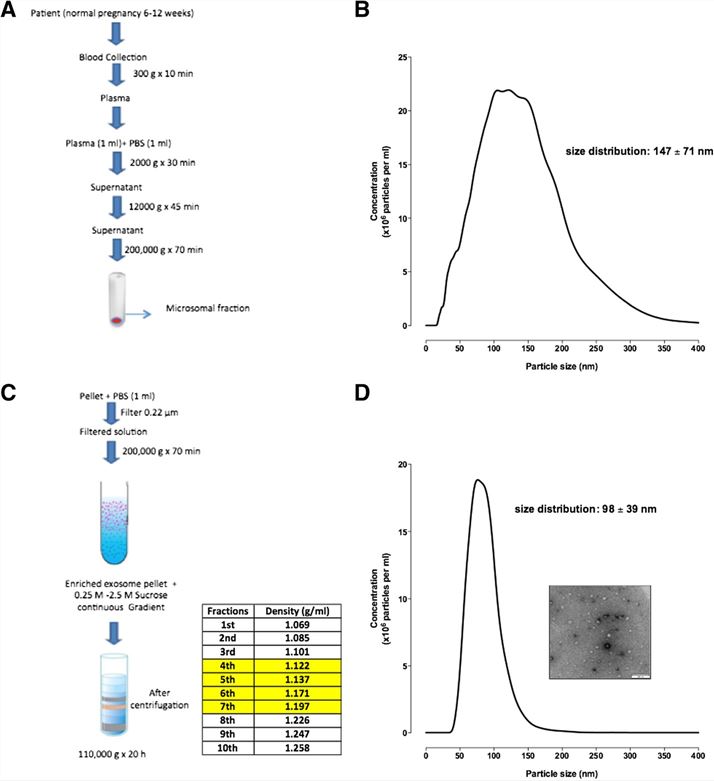Pregnancy Disorders Diagnosis-Applied Exosomes
As a new type of intercellular communication tool, exosomes can carry miRNA, lncRNA, proteins, etc. to act on recipient cells, and play a role in intercellular signal transmission. Therefore, exosomes are expected to become biomarkers for disease diagnosis and early prediction. Previous studies have found that exosomes are involved in maintaining maternal-fetal communication throughout pregnancy and play an important regulatory role in pathological pregnancy. In different pregnancy diseases, exosome profiling in the peripheral blood of pregnant women has confirmed that the changes in exosomal contents may directly affect the function of target cells, leading to adverse pregnancy outcomes. Multiple studies have also observed that differentially expressed miRNAs in amniotic fluid-derived exosomes are associated with classic fetal genetic diseases. Therefore, elucidation of exosome pathways during normal pregnancy and pathological pregnancy will help to develop new early diagnostic techniques for pregnancy complication risk and fetal genetic disease risk to monitor and predict possible pregnancy disorders. Creative Biolabs has extensive experience in exosome isolation and analysis and can provide customers with the most suitable exosome isolation and purification solutions and the most comprehensive exosome profiling services, helping to promote the application of exosomes in non-invasive prenatal diagnosis.
Exosomes During Pregnancy
The role of exosomes in fetomaternal communication during pregnancy has been established. Human placenta-derived exosomes encapsulate immunosuppressive factors released by the placenta. These exosomes protect the fetus by inhibiting various regulatory signals in the maternal immune system and inhibiting the activation of T lymphocytes and natural killer cells that are harmful to pregnancy. In addition, these exosomes support maternal physiology to adapt to the needs of the fetus during pregnancy. This finding suggests that exosomes may serve as biomarkers for monitoring pregnancy disorders using non-invasive liquid biopsy.
 Fig.1 Characterisation of exosome from maternal circulation.1,2
Fig.1 Characterisation of exosome from maternal circulation.1,2
Application of Exosomes in the Pregnancy Disorders Diagnosis
Prenatal diagnosis is mainly aimed at diagnosing whether the fetus suffers from a certain disease before the fetus is born, so as to prevent the birth of children with severe genetic diseases, congenital diseases, or intellectual disabilities. Exosomes exist in serum and various body fluids, as well as in amniotic fluid, placenta, and breast milk. The clinical role of liquid biopsy focusing on exosome contents in peripartum diagnosis has also attracted more and more researchers' attention.
Gestational Hypertension (GH) refers to the blood pressure of pregnant women reaching above 130/85mmHg, manifested as lower extremity edema and dizziness. Gestational diabetes mellitus (GDM) refers to abnormal glucose tolerance in pregnant women. Both GH and GDM will cause various short-term and long-term adverse effects on pregnant women and their offspring. Therefore, early screening and timely intervention of GH and GDM are of great significance to improve the outcome of pregnant women and their offspring. Studies have shown that the concentration of placental exosomes in the plasma of GH patients and GDM patients is significantly higher than that of normal pregnant women, and the pro-inflammatory related molecules in these exosomes are highly expressed. This suggests that early detection of exosomes in body fluids during pregnancy is a promising candidate biomarker for the diagnosis of pregnancy disorders.
Creative Biolabs can provide you with various exosome sequencing services to help you discover exosome biomarkers related to pregnancy disorders. If you want to find exosomal biomarkers that can be used to predict and diagnose pregnancy disorders, please contact us with your ideas. We would like to work with you to help the health of pregnant women and newborns around the world.
References
-
Sarker, S.; et al. Placenta-derived exosomes continuously increase in maternal circulation over the first trimester of pregnancy. Journal of Translational Medicine. 2014, 12:204.
-
under Open Access license CC BY 4.0, without modification.
For Research Use Only. Cannot be used by patients.
Related Services:

 Fig.1 Characterisation of exosome from maternal circulation.1,2
Fig.1 Characterisation of exosome from maternal circulation.1,2









